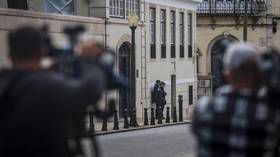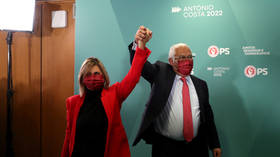Police raid mansion of EU state’s PM

Portuguese police have raided the home of Prime Minister Antonio Costa and detained his chief of staff, Vitor Escaria, as part of a broad corruption investigation. Costa is being investigated for his handling of a lithium mining project and for allegedly rigging contracts for a massive hydrogen terminal.
The Portuguese Attorney General’s office announced the search on Tuesday morning, adding that offices of the environment and infrastructure ministries had been raided, along with 17 homes, and the offices of multiple private companies. Portugal’s Publico news outlet reported that one of Costa’s consultants, two company executives, and the socialist mayor of Sines, Nuno Mascarenha, had also been arrested.
The attorney general’s statement said that the investigation concerns “crimes of malfeasance, active and passive corruption of political office holders, and influence peddling” related to two lithium extraction projects and an EU-funded hydrogen production plant in Sines. The Sines facility is expected to cost €1.5 billion ($1.6 billion) to construct.
Full details of the alleged scheme, as well as Costa’s involvement in it, are unclear. However, the Attorney General’s office confirmed to Publico in January that “the so-called lithium and green hydrogen business” was being investigated. Prior to the report in January, the lithium projects were criticized for their potential harm to the environment.
Although it is unclear what kind of impropriety is suspected in the lithium projects, Portuguese media claimed late last year that Costa and the Ministry of the Environment were “suspected of favoring the EDP/Galp/REN consortium” – a group of three Portuguese energy firms – to build the Sines hydrogen plant.
Costa met with President Marcelo Rebelo de Sousa immediately after the raid. Rebelo de Sousa then summoned Attorney General Lucilia Gago to the presidential palace. No information on either discussion has been made available to the press.
Costa and a coalition of left-wing parties took power in 2015, with the prime minister winning re-election in 2019 and securing an absolute majority for his Socialist Party in 2022. His party is the most popular in Portugal, but Costa’s latest term in office has been turbulent. In his newest government’s first 16 months, 13 ministers resigned over a range of scandals, including embezzlement at state-owned airline TAP.
Liberal Initiative, a center-right opposition party, has called on Costa to resign, and urged Rebelo de Sousa to dissolve parliament if he refuses to step down. The president refused to dissolve parliament earlier this year over the TAP scandal, and constitutional lawyer Teresa Violante told Publico that Costa will not be obliged to resign unless he is formally accused of a crime.













